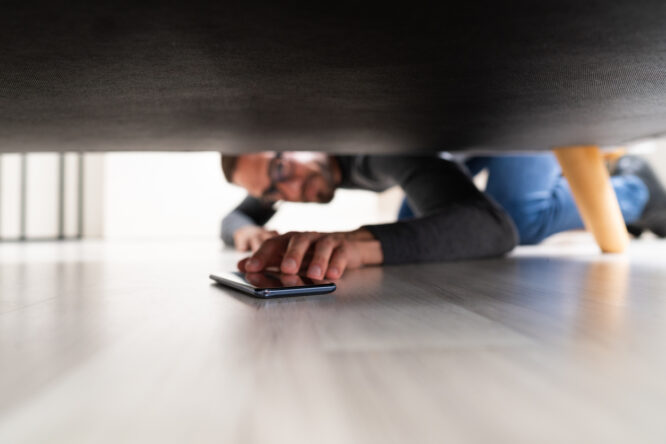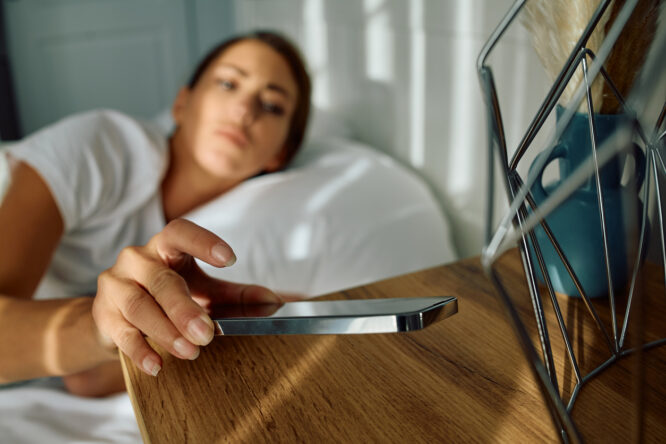Ever feel a wave of panic when you realise you’ve left your phone at home—or worse, lost it completely?

You’re not imagining the anxiety. “Nomophobia”—short for “no mobile phone phobia”—is a very real thing, and it’s quietly becoming one of the most common modern-day struggles. If you’ve noticed yourself getting twitchy without your phone nearby, here are some signs this condition might be playing a bigger role in your life than you realise.
1. You check your phone even when you know there’s nothing new.

You just looked a minute ago, but you find yourself glancing again—out of habit, boredom, or that weird need for a little dopamine hit. It’s not about expecting important news. It’s just about needing that feeling of connection, even when there’s nothing waiting for you. As time goes on, this becomes a loop that’s hard to break. Your phone stops being a tool and starts being a nervous system shortcut—something that soothes restlessness, even when it doesn’t truly satisfy.
2. You feel anxious if your phone battery dips below 20%.

When that little red bar pops up, it’s not just mildly inconvenient—it sends a genuine jolt of anxiety through you. Suddenly, you’re mapping out every plug socket in the area and feeling uneasy until you’re back to full charge. It’s not just because you need the phone operational for emergencies. It’s more about how unsettling it feels to be cut off from your digital lifeline, even for a short time.
3. You keep your phone physically close, even at home.

Whether you’re watching TV, cooking dinner, or even showering, your phone is usually within arm’s reach. It’s not just because you might need it—you feel uncomfortable if it’s out of sight for too long. It’s less about practicality and more about reassurance. Having the phone nearby has quietly become a way of feeling anchored, even when you don’t consciously realise you’re reaching for it.
4. You check for your phone in your pocket or bag, even when you know you didn’t move it.

That quick pocket-pat or bag rummage is almost automatic. Even if you haven’t gone anywhere, you find yourself checking to make sure your phone is still there, like a constant low-level security check. That instinct comes from a deeper fear of disconnection—of being cut off from communication, entertainment, or even just the comfort of having it nearby.
5. You feel phantom vibrations or think you heard a notification.

Sometimes you could swear you felt your phone buzz or heard a ping, only to realise there was no notification at all. Your brain is so tuned into your phone’s signals that it invents them when they’re not even happening. Phantom alerts are a subtle but real sign that your nervous system has grown hyper-attuned to your device. It’s a way your mind stays on high alert for connection at all times.
6. You feel uneasy leaving the house without your phone, even for a quick trip.

Even if you’re just popping down to the corner shop or taking out the bins, being without your phone feels wrong. You might feel exposed, anxious, or like you’re forgetting something critical. It’s not just inconvenience; it’s about losing your safety net. Your phone has become more than a tool; it’s a security blanket you’re rarely willing to part with, even for a few minutes.
7. You keep checking apps even when nothing is happening.

You scroll Instagram, check your texts, refresh your inbox… and do it all again within a few minutes. Even when there’s nothing new, the act of checking itself feels weirdly necessary. It no longer has anything to do with curiosity. Instead, you’re soothing a low-level anxiety that bubbles up when you’re disconnected from the digital world, even briefly.
8. You feel panicked when you misplace your phone even for a second.

That heart-stopping moment when you can’t find your phone, even if it’s just buried under a cushion, hits harder than you’d expect. It’s not just a mild annoyance. It feels like part of you is missing. Misplacing your phone can trigger a spike of genuine fear, almost like a survival response. It shows just how deeply attached your sense of safety has become to that little rectangle of technology.
9. You struggle to focus without your phone nearby.

Even when you’re trying to work, read, or have a conversation, part of your mind keeps flicking back to your phone. It’s like your attention refuses to settle unless you know your device is within easy reach. That mental tug-of-war splits your focus and keeps you from fully immersing yourself in anything for long. It’s not just because you need a distraction. It really is a quiet, persistent sense of needing that link back to your digital lifeline.
10. You check your phone first thing in the morning and last thing at night.
 Source: Unsplash
Source: Unsplash Before you even sit up in bed, your hand’s reaching for your phone. And the last thing you do before you sleep? One final scroll, one last check for notifications. That habit reinforces the idea that you’re never really off duty from your device. Your phone becomes the background hum of your waking life, and it’s hard to imagine a day starting or ending without it.
11. You feel FOMO even when you logically know you’re not missing much.

You can be completely aware that your group chat isn’t on fire or that social media isn’t groundbreaking today, but you still feel uneasy if you’re not checking regularly. Nomophobia isn’t just fear of missing critical news. It’s fear of missing anything—updates, jokes, memes, validation. It’s a fear that life is happening somewhere else without you, even if deep down you know you’re not missing much.
12. You can’t picture spending a full day without your phone.

Going hours, never mind a whole day, without your phone sounds more stressful than freeing. The idea of being unreachable, uninformed, and disconnected feels like losing control of your environment. That dependency isn’t about weakness. It’s about how deeply technology has been woven into the structure of daily life. Luckily, recognising it is the first step toward deciding how you actually want your relationship with your phone to feel.




